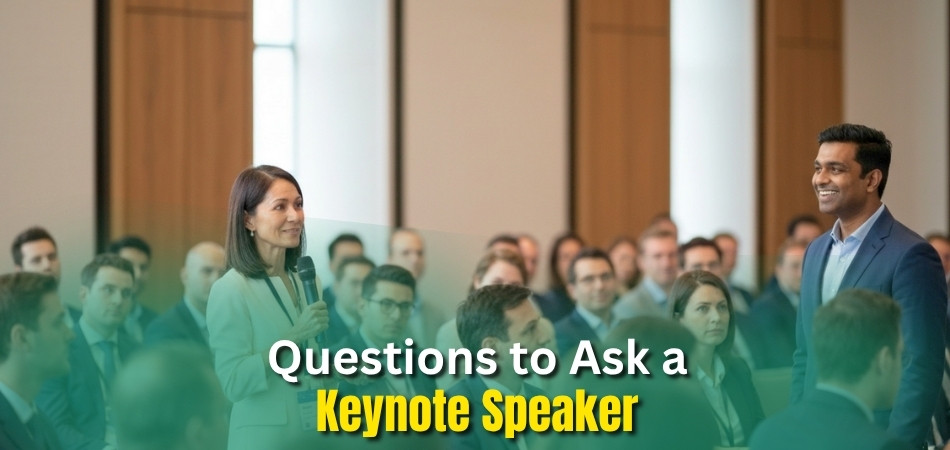A keynote speaker is more than just a presenter—they are a storyteller, motivator, and guide who sets the tone for an event. Their words can inspire, challenge perspectives, and spark new ideas that stay with the audience long after the talk ends.
For this reason, engaging them with the right questions is essential. If you’re wondering about the types of questions to ask a keynote speaker, think of those that invite stories and lessons.
Ask a keynote speaker open questions that help them share stories and lessons. You can ask how they started their career, what challenge taught them the most, or who inspired them. Good questions also include how they stay motivated, what changes they see in their field, or tips for success.
In this article, we’ll share powerful question ideas to help you get the most from your keynote experience.
Types of Questions to Ask a Keynote Speaker
Conversations with keynote speakers become more memorable when thoughtful questions bring out inspiring experiences and useful insights. When preparing to ask questions to a keynote speaker, it is effective to focus on open-ended questions that invite the speaker to share stories, insights, lessons, and experiences. Here are some types of questions that work well for different contexts:
General / Icebreaker Questions:
- Can you tell us about your background and how you got into your current line of work?
- What’s been one of the biggest challenges in your career, and how did you overcome it?
- Who has been your greatest role model or mentor?
- What do you want people to take away from your talks?
Business/Industry Questions:
- What’s the biggest shift you’ve seen in your industry over the last few years?
- How do you handle failure or setbacks as a leader?
- Can you share an ethical dilemma you faced and how you resolved it?
- What is your vision for the future of your industry?
Motivational / Personal Growth Questions:
- What’s one failure or setback that taught you your greatest lesson?
- How do you stay motivated in a constantly changing environment?
- Can you share a moment that changed your way of thinking or working?
- How do you balance professional life with mental health and well-being?
Webinar / Virtual Event Questions:
- What inspired you to pursue your career path?
- What’s one mistake you see people make, and how can they avoid it?
- How do you stay connected and motivated while working remotely?
- Can you share tips for networking in a virtual environment?
Asking questions that show knowledge of the speaker’s background and work, while encouraging them to share meaningful experiences and actionable insights, is key to engaging conversations with keynote speakers. Avoid yes/no questions and prepare by researching the speaker’s expertise and recent work for more impactful dialogue.
How to Prepare Your Questions in Advance?
Sometimes we meet people who inspire us with their words, and we want to ask them something. But asking the right question is not always easy when nerves take over during a big event. A little planning can make conversations more engaging and memorable. With these steps, you can feel confident about asking questions that truly matter.
Research the Speaker
Before the event, take some time to learn about the keynote speaker’s background and interests. Check out their recent talks, articles, or interviews to know what they usually speak about. When you know their expertise, it becomes easier to ask meaningful questions. It also shows respect because you are curious about their work.
Event Context
Every event has a theme, and each speaker plays a different role in that setting. Think about the audience and what they might want to learn. Aligning your questions with the event’s purpose makes them more useful. This way, your question feels connected to both the speaker and the listeners.
Open Questions
Instead of asking questions that only get a yes or no, try open-ended ones. These allow the speaker to share stories, experiences, and real lessons. For example, asking about challenges or role models gives them space to explain. This makes the answer more interesting for everyone listening.
Audience Focus
Your question should not only interest you but also matter to the audience around you. Think about what others might find useful or inspiring. A good question connects with the bigger group, not just your curiosity. When that happens, everyone gains something valuable from the answer.
Mix of Questions
It’s smart to prepare a variety of questions instead of sticking to only one style. Include light questions, like their background or who inspired them, along with deeper ones about their field. You can also ask motivational questions about staying positive or future questions about changes in their industry. A mix keeps the conversation lively and balanced.
Keep It Simple
The best questions are often clear and easy to understand. Don’t make them too long or complicated because that can confuse the speaker. Short, simple words work better and keep everyone focused. When the question is clear, the answer is usually stronger too.
Practice and Prioritize
Write down more questions than you plan to ask, and then choose the best ones. Put the most important ones at the top, so you don’t miss asking them if time is short. Practicing helps you sound confident while speaking. Also, be ready to adjust based on the flow of the talk.
Good questions can turn a talk into an unforgettable learning moment. With preparation and simple steps, you can make sure your questions stand out in a meaningful way. For example, people attending events in India, Japan, or the upcoming conferences in USA can use these tips to make their interactions with speakers even more rewarding.
How Do You Benefit From Asking Questions to the Keynote Speaker?
Sometimes events feel exciting, and you want to know more than what is already shared on stage. Asking questions gives you a chance to connect in a special way with the speaker during the session. It makes the talk more meaningful and personal for you. Here’s how you can benefit from asking questions to the keynote speaker.
Deeper Understanding
Asking questions helps you understand the speaker’s thoughts better than just listening silently. It allows you to clear any confusion and focus on the points that matter most. When you understand deeply, the talk becomes easier to remember. This makes learning both fun and useful.
Real Life Lessons
Speakers often share personal stories when someone asks them the right questions. These stories carry lessons that are practical and easy to apply. Listening to real examples gives you clear ideas about handling different situations. It feels like learning directly from someone’s experience.
Confidence Boost
Speaking up in front of others can feel scary at first. But asking a thoughtful question builds confidence in your voice. Over time, you become more comfortable sharing ideas and speaking in groups. That confidence stays with you beyond the event.
Strong Connection
Questions show that you are truly interested in what the speaker is saying. It helps build a bond between you and the speaker. Sometimes that connection can even open doors for advice or future guidance. Simple curiosity can create meaningful relationships.
Clear Guidance
When you ask about challenges or success tips, the speaker gives advice that is easy to follow. These clear steps can guide you in studies, hobbies, or even career goals. Guidance from experienced people is always valuable. It helps avoid mistakes and saves time.
Audience Value
Your question not only helps you; it helps everyone listening. Other people in the room might have the same doubt, but are too shy to ask. When you ask, they also benefit from the answer. This makes the session better for the whole group.
Future Thinking
Questions about the future allow speakers to share their views on changes and trends. This helps you prepare for what might come next in studies, work, or life. Hearing about future possibilities can spark new ideas in your mind. It encourages you to think beyond today.
When Should You Ask a Keynote Speaker Questions?
The most common and effective time to ask questions is directly after the keynote during structured Q&A. This part of the program is designed to encourage audience interaction, clarity, and a deeper understanding of specific points discussed. Moderators often guide the process to maintain fairness and ensure everyone has an equal opportunity. Using this chance wisely helps you explore meaningful topics without disrupting the overall event schedule.
Beyond the formal session, informal chances arise during networking events, hallway meetings, or relaxed coffee breaks with others. These settings feel more comfortable and allow speakers to share experiences in a friendly and personal manner. You may even hear unique stories that would not fit inside formal presentation time. Such moments often leave lasting impressions and create stronger bonds with speakers who appreciate genuine curiosity.
Preparation ensures that your questions sound thoughtful, clear, and concise rather than random or distracting during discussions. Researching the speaker’s background and even their process for writing a keynote speech helps frame more insightful questions. Clear communication and patience during these moments always make interactions more meaningful for everyone involved. Respectful dialogue encourages strong connections that remain beneficial long after the event concludes.
Common Mistakes to Avoid When Asking Questions
Sometimes people want to ask questions but end up making mistakes that reduce the value of conversations. Careless wording or unclear thoughts often make speakers struggle to give meaningful answers. Good preparation helps you connect better and avoid wasting valuable chances. Here are common mistakes you should know and avoid during events or discussions:
- Too Long: Dragging questions with many unnecessary details makes the speaker lose focus quickly. Keep them short, simple, and clear for maximum clarity.
- Overly Personal: Asking about private life details makes conversations uncomfortable for both the speaker and the listeners. Focus on professional topics that add value.
- Unclear Words: Questions filled with confusing words make it difficult for speakers to respond directly. Use simple phrases that communicate your point.
- Repeating Points: Repeating what another person already asked feels unnecessary and wastes valuable session time. Listen carefully before speaking your question aloud.
- Negative Tone: Questions with a rude or disrespectful tone can quickly spoil the atmosphere. Always keep your words polite and friendly toward speakers.
- Yes/No Style: Closed questions that allow only yes or no answers stop meaningful sharing. Open-ended style encourages stories, insights, and detailed experiences.
- Off Topic: Irrelevant questions that drift away from the main discussion waste opportunities. Always connect your query with the theme being discussed.
How You Asking Questions Benefit Other Audiences?
During events, many people listen carefully, but only a few raise their hands to ask questions aloud. Those moments often spark interest and encourage everyone else to think more actively about the talk. A simple question can change the atmosphere inside the hall completely. With the right approach, your curiosity ends up helping others in ways you might not notice.
More Engagement
When you ask a question, the audience becomes more awake and focused. It shifts the room from only listening to actively thinking. The energy in the session increases, and more people start paying attention. Engaged audiences usually walk away with stronger takeaways from the talk.
Better Understanding
Sometimes a point feels unclear, and your question helps bring a detailed explanation. The speaker’s answer makes the topic easier for everyone to follow. This shared clarity ensures that no one leaves the session feeling confused. Understanding the message completely makes the learning much more useful.
New Perspectives
Every question brings a new angle that others may not have considered before. It opens the discussion to different ideas and challenges. Sometimes the speaker shares extra real-life examples that highlight useful solutions. This variety of perspectives creates a richer and more meaningful learning experience.
Shared Connection
Asking questions makes people feel part of something bigger, not just quiet listeners. It builds a sense of belonging within the group. Many realize that their doubts are shared by others in the audience. This is one reason the purpose of a keynote speaker includes building strong community connections.
Stronger Message
A live Q&A helps speakers refine their points and explain them in more depth. They often highlight important lessons again with clearer words. This repetition helps the audience remember key ideas better. The exchange makes the whole presentation stronger and more memorable.
FAQs About Questions to Ask a Keynote Speaker
Asking the right questions makes a keynote session more engaging and memorable. Audiences gain deeper insights when questions go beyond surface-level topics. Here are some frequently asked questions to guide you in making conversations meaningful and impactful.
What Are Some Creative Questions to Ask a Keynote Speaker?
Creative questions often explore fun angles like what book changed their life, or a surprising habit that helps them succeed. These unusual questions spark engaging answers, giving the audience something memorable beyond industry-related or professional points.
How Can Humor Be Used When Asking a Question?
Humor helps ease tension and create a lighter mood during serious discussions. If you include a small, respectful touch of humor, it shows personality and helps the speaker relax. Just make sure your humor is appropriate and relevant.
Should I Personalize Questions for the Speaker?
Yes, tailoring questions to the speaker makes your interaction stronger. Research their past talks, articles, or achievements before the event. When you connect your question to their work, it feels more genuine, and they often provide deeper, thoughtful answers.
Can I Ask Questions About Their Failures?
Definitely, but ask respectfully. Questions about failures encourage honest stories that reveal growth, resilience, and learning. Audiences connect more deeply when speakers share struggles openly. These lessons often become more powerful than simply discussing success or achievements.
What Are Some Quick Questions for a Limited Time?
In tight schedules, ask short questions that still invite detail, like “What inspires you most daily?” Quick questions keep conversations flowing without taking too much time, yet still offer space for speakers to share insights that resonate with audiences.
Is It Okay to Ask About Their Personal Habits?
Yes, as long as the habits relate to success, productivity, or motivation. For example, asking about morning routines, focus strategies, or stress management can be helpful. These insights give audiences practical takeaways they can apply in their everyday lives.
Can I Ask Questions Related to Future Trends?
Future-focused questions are always effective. Asking about trends or upcoming changes in their field encourages predictions and valuable insights. Audiences appreciate hearing about what lies ahead, giving them new ideas for preparing, adapting, and growing alongside industry developments.
What Should I Avoid When Asking Questions?
Avoid sensitive personal details, repetitive queries, or negative tones that distract from the discussion. Keep questions relevant to the event and the speaker’s expertise. Respectful, thoughtful, and clear wording ensures meaningful responses that benefit both you and the larger audience.
Final Words
Good events feel better when you ask clear and thoughtful questions. They help you learn, understand, and remember important ideas. The best questions to ask a keynote speaker are simple, open, and meaningful for both you and the audience.
Such questions bring stories, advice, and lessons that inspire action. With a little preparation and courage, your words can turn a normal talk into a special and useful experience.








